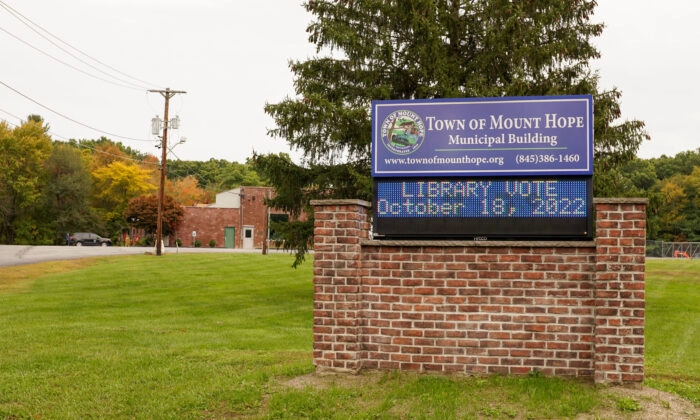The town board has set up a new advisory board for the sewer plant in Hidden Valley. The purpose is to improve communications between the town and the 100 or so homes in the district. Landslides occur in areas that are prone to ground instability due to steep slopes and glacial lake clay soils. Small areas of the Town in Otisville and Deerpark meet this criteria.
Advisory Board Members
The Town Board recently approved the creation of an advisory board to improve communications between the town and 100 or so residents of the Hidden Valley sewer district. The board will work with Town Board Engineer Jason Pitingaro on short- and long-term planning for the plant. It will also oversee the collection of septic system assessments, ensure that residents are following the town’s sewer law and provide other general advice to the Town Board.
The committee is working with Steve Grimm of the New York Rural Water Association, who attends all meetings and offers a variety of information about funding sources, best practices and technical assistance. In addition, the committee will meet monthly with Hague’s wastewater treatment plant staff to discuss issues.
In announcing the creation of the board, Supervisor Paul Rickard said that he has heard concerns about potential impacts in the Hidden Valley open space. He pointed out that the preferred project alignment is constructed entirely within public rights-of-way and avoids the open space. The Final Environmental Impact Report (EIR) was released for a ten-day public review period on November 9, 2012.
Manion’s term has been marked by the completion of bike and hiking trails, installation of new playground equipment at Kids Castle and the construction of the amphitheater in Central Park, as well as the expansion of the public sewer and water system in Pebble Ridge. In addition to her duties on the town board, she has served as liaison for the Bike and Hike Committee, Dog Park Advisory Committee, Friends of Kids Castle, local Traffic Advisory Board, parks and recreation, and public water and sewer boards.
Sewer Plant
When the town board unanimously approved the new advisory board on March 18 it also appointed five residents to serve on a special committee that will improve communications between the town board and the 100 or so households in the Hidden Valley sewer district. They will have access to the town board engineer and be actively involved in short- and long-term planning for the plant, according to Supervisor Paul Rickard.
The new sewage treatment plant for the Hidden Valley development is now operating, and a developer is considering plans to build 130 homes there. But some homeowners are grousing about footing the bill for a larger plant, even though developers will be required to put up $8,200 per home they build and use it immediately to pay off a bond that covers the cost of the new treatment facility.
The county sanitary engineering office still has a lot of work to do. It was ordered to clean up operations at its wastewater plants by the Environmental Protection Agency when the district was formed in 2009 – 2010. Some plants, such as those at Mount Hope and October Hills campground, are at or near their current capacity. Others, like those at Berlin and Walnut Creek, need to be upgraded or repaired. And the office’s budget has been strained by EPA citations and other needs.
Water Treatment Plant
The wastewater treatment plant is a highly efficient facility that utilizes aeration, sedimentation, filtration, and disinfection processes to produce safe drinking water. The plant has received the prestigious N.C. Area Wide Optimization Award for turbidity removal, which means the treated water is very clear and has very little particulate matter in it. This is a major accomplishment for a wastewater treatment plant.
The plant treats domestic waste from residences, commercial waste from restaurants, and industrial waste from City manufacturing plants. A 3-mile long combined sewer overflow abatement system also transports waste for treatment, significantly reducing pollution of nearby bays and rivers.
Wastewater treatment facilities are designed to minimize environmental impacts and maximize the use of water while minimizing costs and energy consumption. To this end, they use best management practices in operation and maintenance of equipment and a system of monitoring to ensure the quality of drinking water is maintained at the highest standards.
The Town Board of Mount Hope is a small Municipal Separate Storm Sewer System (MS4) and is required to develop, implement and enforce an MS4 Pollution Prevention Program. This program is designed to reduce the discharge of pollutants to State waters to the maximum extent practicable.
Sewer Use Law
A sewer system is intended to convey wastewater for treatment and ultimate disposal in the state’s waters. Wastewater consists of sanitary sewage and other wastes generated on or discharged from real property within the service area and may include, but is not limited to, industrial wastes resulting from manufacturing processes, trade, business or services. The Town Board shall have the power and authority to establish, alter, change, modify, reduce, enlarge or consolidate the bounds of the service area, by action.
No person shall make any connections or openings to a building sewer, street sewer or other public sewer or appurtenance thereof without first having obtained a permit issued by the Superintendent of Public Works for such purpose. The application for a permit shall include, but not be limited to, a description of the proposed connection and its location, the type of construction and materials to be used, and an estimate of the cost to be borne by the parcel owner or user.
No person shall connect a drain to a public sewer which is intended to discharge inflow, including, but not limited to, footing drains, roof leaders, basement drains, sump pumps, cellar drains, catch basins and uncontaminated cooling water discharges. The superintendent may take such actions as are necessary to determine the amount of inflow caused by a particular parcel and charge the user of such parcel a fee not to exceed five times the normal sewage volume charge.

















Leave a comment